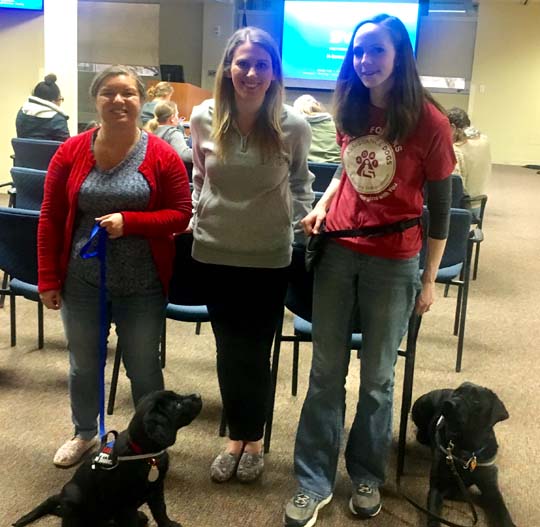Animal companions can have an astounding benefit to the health of their human owners. Decreased stress and lower blood pressure are often observed through interaction with animals.
For many, however, the relationship they have with their four-legged companion can be life-changing. Persons with disabilities make up one of the largest minorities in the United States, and many of those affected have a service animal to help with daily tasks.

Anna Jones, Assistance Dogs for Achieving Independence training manager, right, brought Penny, the dog on the right, and Potter, the puppy, to a Rocket Service Dogs meeting, where they met Summer Martin, graduate student in social work, left, and
Danielle Tscherne, graduate student in criminal justice and leader of the Rocket Service Dogs organization.
Dr. Janet Hoy, associate professor in the School of Social Justice and adviser for Rocket Service Dogs, said the idea for the organization came after visiting the Assistance Dogs for Achieving Independence training center in Sylvania.
“Service dogs can tremendously increase independence and quality of life for a person living with a disability,” Hoy said. “Unfortunately, there is often a long wait list before a service dog can be obtained. Through providing foster placements and training, Rocket Service Dogs can increase the numbers of service and therapy dogs available to be placed with individuals living with disabilities in the region.”
Through the partnership with Assistance Dogs for Achieving Independence, students involved with Rocket Service Dogs will be provided with food, veterinary care and regular classes for their service dog trainees.
Hoy stressed the importance of regular training and socialization: “Service dog training would occur under the direction of an Assistance Dogs for Achieving Independence trainer, and would entail attending regular classes and practicing in between to teach a service dog trainee basic commands and later more specialized tasks.
“Socialization of the service dog trainees in a wide variety of settings is also a key part of training; it is imperative that service dog trainees become comfortable out in public in places such as restaurants, stores, sport events, etc.,” she said. “Puppy sitters provide respite care and socialization for the service dog trainees when the primary caregiver/trainer is unable to do so.”
Those who feel they have time and love to give to a future service dog — and a strong interest in learning about dog behavior, human health and disability — are encouraged to reach out to Rocket Service Dogs.
More information on the organization, including upcoming meetings, can be found on its Facebook page, facebook.com/rocketservicedogs.